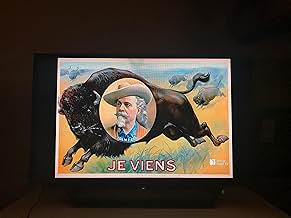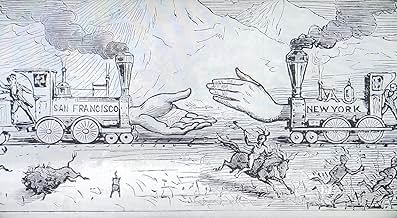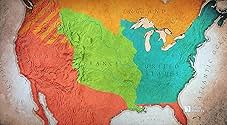Bison : une histoire de l'Amérique
Titre original : The American Buffalo
- Mini-série télévisée
- 2023
- 3h 54min
Un voyage à travers plus de 10 000 ans d'histoire de l'Amérique du Nord et à travers certains des paysages les plus emblématiques du continent, retraçant l'évolution du mammifère.Un voyage à travers plus de 10 000 ans d'histoire de l'Amérique du Nord et à travers certains des paysages les plus emblématiques du continent, retraçant l'évolution du mammifère.Un voyage à travers plus de 10 000 ans d'histoire de l'Amérique du Nord et à travers certains des paysages les plus emblématiques du continent, retraçant l'évolution du mammifère.
- Récompenses
- 1 victoire au total
Parcourir les épisodes
Avis à la une
Very simply, this film is an important story. I have to think that this is Ken, going out of his way, to subtly make a point. He could have told this story years ago, but choose "now" to do so. It is a tale of stunning ignorance and stupidity, and ought to be a must-see for everyone. Specifically, it shows how humans can simply choose to be blind to an unconscionable nightmare fiasco that they are creating, at a rapidly increasing speed, simply for the sake of money. It VERY MUCH mirrors what the larger human populace is repeating right now, except this time, WE are the buffalo.
Ken's film exhibits the fact that you can turn _some_ disastrous situations around, even though, historically speaking, we seem to have not been inclined to do so (just ask the Passenger pigeon, Tasmanian tiger, and even the mastodon, how it worked out for them).
Again, a great story. They should be showing it to kids in grade school, as that might result in some important conversations around the dinner table at home.
Ken's film exhibits the fact that you can turn _some_ disastrous situations around, even though, historically speaking, we seem to have not been inclined to do so (just ask the Passenger pigeon, Tasmanian tiger, and even the mastodon, how it worked out for them).
Again, a great story. They should be showing it to kids in grade school, as that might result in some important conversations around the dinner table at home.
The drive to near extinction of the American buffalo was perhaps inevitable: technology has given mankind many options to exploit nature, but without the sense of restraint to do so sustainably. What's shocking in this documentary is not just the speed with which the buffalo were exterminated, but that everyone could see what was happening and did nothing to stop it. They could also see that the end of the species would end the traditional way of life of the native human population; mostly, Americans of European ancestry saw this as a good thing. The second part tells the story of how the buffalo was saved; but it could be argued that the peoples who depended on it have never recovered. There's a warning here for all of us today as we face climate change: might we once again walk eyes-open into environmental catastrophe, not appreciating what we have until after it has gone?
This documentary shook me to my core and should be required viewing in all American schools and universities in my humble opinion. I had not felt this particular way since I walked out of the Native American Smithsonian museum some years back. Sadness, guilt, anger, confusion, disgust.
The stain of genocide, slavery, imperialism and colonialism wrought on the planet and humanity by Europeans and Americans will never be washed away. Infinite and never ending shame to those that participated in it.
Ken Burns is a national and global treasure for his story telling abilities. This documentary is no different from his others, in its clarity and brutality of telling the cold, hard, historical truth.
The stain of genocide, slavery, imperialism and colonialism wrought on the planet and humanity by Europeans and Americans will never be washed away. Infinite and never ending shame to those that participated in it.
Ken Burns is a national and global treasure for his story telling abilities. This documentary is no different from his others, in its clarity and brutality of telling the cold, hard, historical truth.
10jmlj99
Hard to watch? Yes. It is heartbreaking. I started watching the show with my husband, it was very depressing, but the story and the history needed to be told and shared. We all need to know and remember how people wiped out the Native Americans and the lands and the buffaloes that sustained them. It's so hard to believe that people could not respect the land and lives of others in the past. That was the way in the past. Take what you want and who cares about the feelings and the lifestyle of the natives. I'm glad I'm in my 60's and it saddens me to see that we the American people still don't recognize how badly we screwed the native population.
I just finished watching The American Buffalo and once again Ken Burns hits it out of the park! I thought I knew the plight of the Bison, and how it also impacted Native Americans, but I learned much more about the history of the past 200 years. This is a very touching and thought provoking documentary and reminded me of the photo of a huge mountain of bison skulls I first saw as a child. I'd never even heard of the amazing meter shower of the 1880s or of the horrid Gore who killed thousands of animals just for fun. I'm looking forward to part 2 tomorrow night. At least enough calves were saved that the species did not go extinct. Thank God for Yellowstone Park.
Le saviez-vous
- AnecdotesA hour long conversation preview with Ken Burns and indigenous leaders is hosted by Judy Woodruff on PBS 23 September.
- ConnexionsFeatured in Ken Burns: One Nation, Many Stories (2024)
Meilleurs choix
Connectez-vous pour évaluer et suivre la liste de favoris afin de recevoir des recommandations personnalisées
- How many seasons does The American Buffalo have?Alimenté par Alexa
Détails
- Durée3 heures 54 minutes
- Couleur
Contribuer à cette page
Suggérer une modification ou ajouter du contenu manquant




























